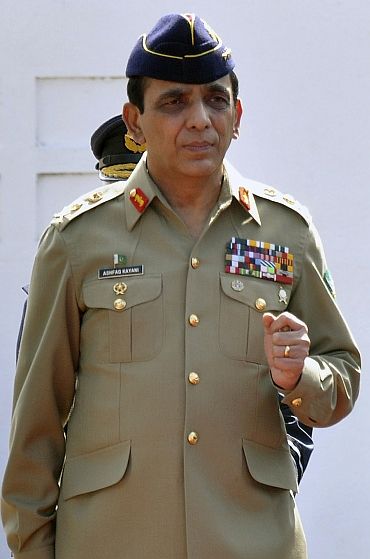 With Pakistan's powerful army chief Gen Ashfaq Parvez Kayani's term coming to an end in November, names of top Generals who are likely to succeed him are being discussed in the political circles and in the corridors of power.
With Pakistan's powerful army chief Gen Ashfaq Parvez Kayani's term coming to an end in November, names of top Generals who are likely to succeed him are being discussed in the political circles and in the corridors of power.
The appointment of the next army chief has gained wide attention in view of past difficulties faced by civilian governments in appointing persons to the coveted military post.
A number of names are in circulation and leading the race is Lt Gen Haroon Aslam, currently chief of logistics staff. He will be the senior most General when Kayani steps down. Lt Gen Aslam has served as director military operations, commanded the elite force division (special services group) and had been corps commander of Bahawalpur.
He also lead the successful anti-militancy operation in the Swat in 2009. He is due to retire on April 9 next year. The other two in contention, based on seniority, will be Lt Gen Rashid Mehmood, Chief of General Staff and Lt Gen Raheel Sharif.
Following them is Lieutenant General Tariq Khan, commander of 1 strike corps at Mangla and then Inter-Services Intelligence chief Lt Gen Zaheer-ul Islam at the fifth spot.
The appointment of a new army chief comes at a time when the country is facing huge national security issues and is in the midst of the North Atlantic Treaty Organisation troop withdrawal in Afghanistan.
The government is also in the initial stages of holding peace talks with the Pakistani Taliban and other terrorist groups.
Kayani, 61, was appointed the army chief by former military ruler Pervez Musharraf in 2007. He was given an unprecedented three-year extension by then premier Yousuf Raza Gilani in 2010 and is set to retire on November 28.
Another post that will soon fall vacant is that of the chairman of joint chiefs of staff committee. "I think the seniority will be a big criterion since the prime minister himself has said so. But seniority does not mean other aspects would not be looked into. A lot of thought goes into the background of the officer, his postings, political inclination and whether he has led operations or commanded important Corps," Lt Gen (Retd) Talat Masood told PTI.
Senior Pakistani journalist Talat Hussain said, "The rule of the thumb is seniority. Once the Prime Minister gets the names based on seniority, he can select anyone. Tenure differences of a few months don't matter.
"If Lt Gen Aslam is appointed at the CJCSC, which falls vacant first, then Lt Gen Rashid might become COAS. If the CJCSC post goes to any of the other two services, then Lt Gen Aslam gets to be the army chief."
Meanwhile, cricketer-turned-politician Imran Khan has said Kayani should not be given an extension. Imrans's argument is that national institutions needed to be strengthened and not the individuals.
"In order to curtail crime, national institutions needed to be strengthened, as opposed to individuals and therefore General Kayani's tenure should not be extended," Imran said in an interview to Express News channel .
Just days before he was elected as the prime minister, Nawaz Sharif while refusing to play second fiddle to the powerful military, had said he will be the army chief's "boss".
Replying to a query if he would give an extension to Kayani, he had said, "I don't think he will ask any further extension or he will be interested in any further extension. I will go by the book; I will go by the merit. Who so ever is the senior most, will have to occupy this...the next one, the next in line."
For Sharif, choosing the new army chief would be a calibrated move. This would be the fourth time he would be choosing an army chief. Sharif chose Abdul Waheed Kakar as the army chief in 1993 but the General soon ditched him and played a key role in Sharif's resignation. Kakar had superseded at least four senior generals.
In 1998, he hand-picked Pervez Musharraf to head the Army and he too had superseded at least two generals. Musharraf first plotted the Kargil misadventure derailing the Sharif's India-Pakistan peace dialogue and then engineered a coup against prime minister.
Sharif selected Ziauddin Butt in October 1999 but he could not take over as the army chief due to the coup by Musharraf.











 © 2025
© 2025